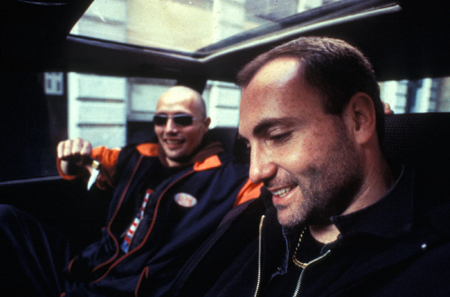|
Reviews of Recent Independent, Foreign, & Documentary Films in Theaters and DVD/Home Video
PUSHER (1996, 105 min.) Directed by: Nicolas Winding Refn. Produced by: Henrik Danstrup. Written by: Refn & Jens Dahl. Director of Photography: Morten Søborg. Edited by Anne Østerud. Music by: Peter Peter & Povl Kristian. Country of Origin: Denmark. With: Kim Bodnia, Zlatko Buric, Mads Mikkelsen & Laura Drasbaek.
PUSHER II: WITH BLOOD ON MY HANDS (2004, 96 min.)
PUSHER III: I’M THE ANGEL OF DEATH (2005, 102 min.) Set in the crude and harsh Copenhagen underworld, this crime trilogy gets better as it goes along, as if filmmaker Nicolas Winding Refn found his footing in the end after making admirable, if sometimes not very intriguing, turns the first time around. Apparently the first film was a smash success in Denmark and solidified the reputation of Refn. His first effort is not without merits, but it seems he's more able to dig deeper into the drama and psychological grit as the years rolled on. In Pusher, friends and small-time dope peddlers Frank (Kim Bodnia) and Tonny (Mads Mikkelsen) don’t really do much for the first half-hour. They crack lurid jokes and banter back and forth until the decidedly full-on vérité style goes into swing (apparently inspired, as stated in the press notes, by The Battle of Algiers). The plot moves casually along to its main turning point – a drug deal which goes bad for Frank, who’s usually on his toes. Running from the cops, he dumps his stash that he had hoped to sell. Unfortunately, this now puts him into debt with the imposing drug boss Milo (Zlatko Buric in possibly the film’s best performance), with consequences quite dire if he doesn’t pay him back. This leads Frank on a downward spiral all in the span of a week (à la Clerks – another influence on Refn – title cards come up to remind us of each day as it fatefully passes). Much of the film strives for cleverness and a kind of hipper-than-thou attitude that was definitely in at that moment in the ‘90s. If anything, it’s quite the coincidence that this film came out at the same time as another, greater, drug film, Trainspotting. While it wouldn’t be fair to compare the two outright, what Trainspotting gets right with style and characters Pusher only gets right with the former. It’s not really all that interesting at first, as one waits for the pace to quick in. It does then, in spurts, but more so due to Refn’s reckless, on-the-fly hand-held camera. Unfortunately, the drama here doesn’t really click that well with the dialog, leaving characters way too thin (i.e., Tonny the typical knuckleheaded friend). For American audiences, it might be almost, well, dated. But Refn is wise enough, once returning to the series, to pick up with Tonny and Milo – leaving behind the only casually interesting Frank – and to pick apart their own mind-sets. Pusher II finds the Tonny (Mikkelsen) just out of prison, finding work with a group of car thieves run by his own father, who considers his son the bottom of the barrel. And his father’s assessment at first glance is correct; Tonny is an escapist, into as much drugs, pornography and petty crimes as he can muster, and Refn captures the absurdity of his desperation when Tonny visits a whorehouse with strange results that need not be mentioned here. But Tonny’s flaws make him consistently compelling, and even a clichéd subplot - a one-time ex-girlfriend had a baby while he was in prison that may or may not be his – is dealt with in some unconventional ways (she’s into the druggie enviroment as much as he is). Overall, the story does seem to occasionally drift into being too disengaging by the amount of repetition in Tonny’s actions, but not as often as the characters were in part one. And the performances are uniformly very good, particularly by the crime boss father (Leif Sylvester Petersen). On top of this, the script is much sharper, and there are even some funny moments, however dark.
Pusher III takes on the story of Milo, the crime kingpin prominent in part one and featured briefly in the second.
Of the three, this is likely the film I would recommend the most, even to those who have yet to see parts one and two
(none are really connected through story, just in mood and style). The story here involves Milo getting ready for a birthday party
for his adult daughter Milena (Marinela Dekic), and in the midst of this, also having to deal with two burdens – a shipment of
ecstasy, instead of heroin, that he has to sell for an Albanian outsider, and catering to a group of Poles from out of town.
All this takes place within that wonderful concept – the 24-hour storyline – as Milo also has to take on his greatest challenge,
his drug habit. Unlike in Pusher, the pace never lags, and the dynamics between the characters are all wonderfully detailed.
Even in the film’s more violent and gory second half (some of it is downright disgusting, which is perfect for the bleak tone of the
picture), Buric is always believable to the point of him being Milo. It’s a performance like Paul Sorvino’s in
GoodFellas, with a few obvious differences, as both actors inhabit their characters with equal amounts of nuance and total
command of the room. And Milo’s vices are far more believable and tragic than those of the characters in the other two films.
Even with the similar vérité style still imposed, Pusher III’s a more mature film – a great ride of both subtlety and extreme surprises.
Jack Gattanella
|

